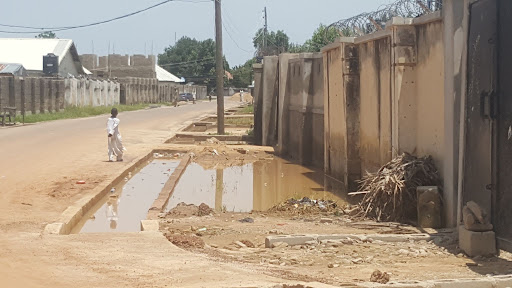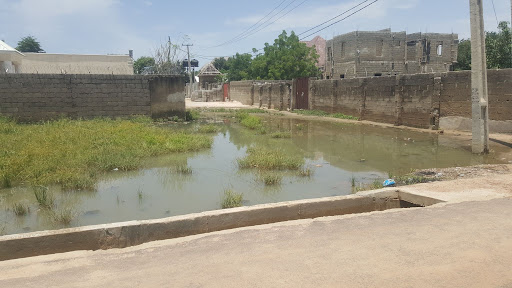Poorly Constructed Drainages In Maiduguri’s New Layouts Threaten Public Health
In Maiduguri, Borno State capital, poorly-built drainages, which leaves the environment prone to flooding, are putting people’s lives at risk amid a cholera epidemic.

This is not the best of times for many residents of Maiduguri, Borno State, Northeast Nigeria, as floods occasioned by heavy downpour continues to steal their happiness.
Before the rains, the Borno State Ministry of Environment had enforced the evacuation of blocked drainages around all major streets as well as nooks and crannies of Maiduguri metropolis.
The state’s attorney general, Kaka-Shehu Lawan, supervised the exercise in his capacity as Commissioner of Environment. Typically, the government carries out drainage evacuation annually as a means of mitigating flooding.
But this year’s exercise went beyond removal of dirt from the waterways to the excavation of forgotten mega drainages that were blocked for many years. Those familiar with the original master design of the Maiduguri town plan blamed the perennial flooding in the city on the blockage of major channels.
Health experts have often blamed the outbreak of diseases like cholera and polio on poor hygiene in the city, which is made worse during the rainy season.
So much work was done this year to discover underground tunnels, especially around the post office area, so much that everyone was positive that the city would record some respite from flooding. But that has not been the case for Maiduguri with its over three million people.
The people’s hope was dashed, especially in the Jiddari Polo area where a new layout of roads and drainage network was recently commissioned. Expectations that this would bring succour were not met due to what experts consider as a “poorly designed and executed job.”
Apart from the recent outbreak of cholera in seven Local Government Areas (LGAs) of the state including Maiduguri and Jere, which make up the state capital, residents are also faced with the challenge of flooding.
The heavy downpour that occurred in the past weeks had not only made movement difficult for those commuting in and out of the Jiddari Polo area, it also sent them out of their homes.
“Three of our neighbours have moved out of the neighbourhood to settle in another area this week because water had submerged their homes,” said Adamu Ibrahim, a dry cleaner.
HumAngle observed that while there are dual drainages on both sides of the newly constructed roads, the draining facilities only hold water and never sift them away.
Most of the drainages are either not designed to ease the flow of water or they are blocked at the end of the street where the road network terminates. Because of that, water continues to pile up until they begin to sift into homes.
Substandard drainage
Drainages, according to experts, are designed to help remove water from the neighbourhood and roads. Also, a basic principle in civil engineering is to look at how it impacts the neighbourhood.

In Jiddari Polo, most of the roads and drainages are elevated above the houses, thereby making it practically impossible for the waters that accumulate in the house to drain out. As such, the homes become flooded at the slightest downpour.
Biola Junaid, a seasoned architect and civil engineering consultant has in an interview with HumAngle opined that “when building roads in already established neighbourhoods and you want the road to be high, the drainage must be deep such that the bottom of the drain will be lower than the floor level of the neighbourhoods.”
“Even if the road is up there and it also drains into the gutter, the neighbourhoods as well can still drain their water into it.”
A Kaduna State-based architect added that “the essence of a drainage is defeated if it does not flow and take water away to a canal or any designated outlet.”
Threat to public health
According to the World Health Organisation (WHO), poor drainage systems “contribute significantly to the spread of diseases such as typhoid and cholera, and may increase the likelihood of contracting worm infections from soil contaminated by faeces.”
Also, that “flooding itself may displace populations and lead to further health problems.”
This reporter has seen flooded homes where water flows into the sewage systems and fills it up to overflow at a time when the state is battling cholera which has already claimed over 45 lives in seven LGAs.
Residents now resort to using industrial pumping machines to take out water from their homes into the already filled and stagnant drainage.
Yunusa Ibrahim, a property owner in Polo said “my family and I have been forced to leave our house because it’s been submerged.”
“The dirty water flows in from the overfilled drainage into the house so much that it filled up the soak away pit and even our borehole now pumps dirty water to the overhead tank. We cannot live in that house under such an unhygienic situation.”
Ibrahim, a father of eight children, blamed their plight on “drainages that don’t flow.”
Another resident using a water pumping machine to reduce the pool in his compound and who did not want his name mentioned said: “The roads are constructed but here we are now suffering the impact of poor design.
“Since the houses have been here before the roads, common sense should have made the engineers to ensure the surface is excavated to align or even go lower than the house to enable easy flow of water into the drainages. But the reverse is the case here. The drainages are the ones discharging water into our homes.
“If the governor would listen to advice from people like us, they should always do background checks on the quality of the contractors and their track records. You can’t take a government contract and at the end of the day, you only see some unskilled labourers digging the drainage and laying the concrete without professional consideration for level.”
Ministry of Works explains
HumAngle contacted officials at the state ministry of works to find out if they are aware of the situation. The Commissioner for Works, Architect Yerima Saleh, said efforts are being made to remedy the problem.
Some of the ministry’s officials who earlier went to fact-check the claims of this reporter visited some of the locations where the drainages were poorly constructed and admitted that the contractors failed to satisfy the standards specified in the contract document.
In some of the locations where the drainage failed to drain stagnant water, the officials also admitted lapses even as they explained that budgets had been made to provide an outfall for the stagnant waters of Jiddari and Polo layouts.
But until that is done, residents would have to live with the threat of diseases associated with undrained water that snakes through their neighbourhood.
Support Our Journalism
There are millions of ordinary people affected by conflict in Africa whose stories are missing in the mainstream media. HumAngle is determined to tell those challenging and under-reported stories, hoping that the people impacted by these conflicts will find the safety and security they deserve.
To ensure that we continue to provide public service coverage, we have a small favour to ask you. We want you to be part of our journalistic endeavour by contributing a token to us.
Your donation will further promote a robust, free, and independent media.
Donate HereStay Closer To The Stories That Matter





You write up on drainages in Maiduguri has done little justice to so many actors who have contributed to this year’s flood free rainy season. ICRC, UNDP and her partner Herwa have immensely contributed too.
You seem to talk about jiddari polo may be because that is the only part of Maiduguri that concerns you or you are a resident?
Please go round Maiduguri even today or tomorrow. There is alot ongoing in Waste Management with another Project being funded by EU and UNDP and implemented by Herwa, Take the pains to go round Maiduguri and ask for how well the project has tried or performed to stop the perennial flooding in Maiduguri or even Bana or Biu for that matter.. The Ministry of Egģģnvironment has achieved a great feat however, the credit also goes to UNDP, EU, ICRC and Herwa for a job also done well.
On the issue of Cholera, note also the the wide spread open defecation into drainages in most parts of Maiduguri, sewage are connected to the drainages which themselves have been blocked deliberately by the residents who dump their refuse into drainage.
Kindly research some more to give the public correct information and right information. If you do not mind, I can take you round 29 project communities where drainages are currently evacuated and the solid waste disposed of within Maiduguri.
Looking forward to meeting you. Mohammed
08035820512